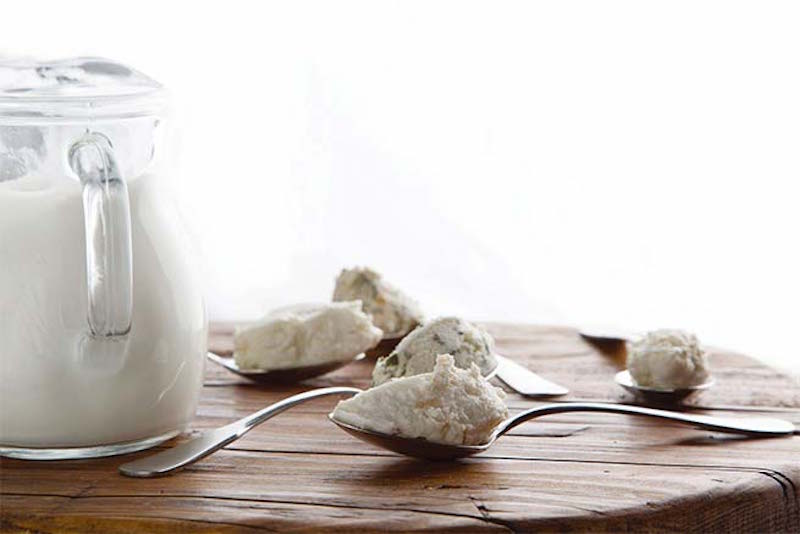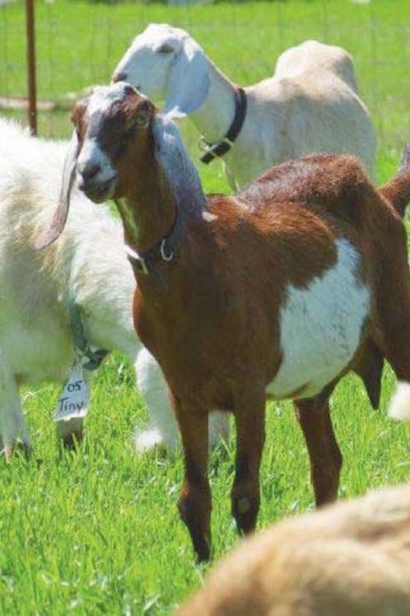Happy Goats Produce Great Cheese at Canyon Ridge Farms
When you arrive at Canyon Ridge Farms, a 50-acre farm just outside of Welling, Oklahoma, near Tahlequah, one of the first things you notice, other than just how far off the beaten path it is, is the herd of goats lazily laying about. Basking in the sunlight, flicking the occasional fly, rutting and being cautious of me, the goats are essential to Canyon Ridge Farms, which specializes in top-quality goat cheese.
For those who don’t think you like goat cheese, or have never tried it, the ones from Canyon Ridge Farms is a good place to start. Rich, tangy, creamy and delicious, it is made with the skill and care one can expect from our local producers. It is not like the blue-labeled logs you find in the grocery store—which, I must admit, I like just fine. It is far richer, and more subtle in that sometimes off-putting “goatness,” for lack of a better word, that many associate with goat cheese. So give it one more shot. You may be surprised.
Owned and operated by Marty and Chrys Tinsley, Canyon Ridge Farms started life in 2002 as the typical small farm, focusing on produce rather than goat milk. As Marty showed me around, she told me about how the goat enclosure used to be the fields where the produce was grown. Gone are the rows of cabbages, lettuces and other vegetables. In their place lives now a herd of little goats. What used to be a greenhouse is now a goat enclosure in inclement weather. You can’t discount farmer ingenuity.
Back then, goat milk was just an incidental part of the operation. If the farm wanted to sell goat milk, it had to ship the milk out to be pasteurized, which made it unprofitable. What milk they did produce, they would keep for themselves.
Nevertheless, the Tinsleys found themselves being asked about goat milk and goat cheese when they were out selling their produce. The Tinsleys had always had goats and they knew how to make cheese, so an idea was born. Fast forward to 2011. The Tinsleys stopped growing vegetables and began focusing their time and attention on the goat cheese. The day begins at 4am and ends around 10pm.
With 150 or so goats, the operation was, and is, not a large “commercial” operation by any means. Only about 75 goats are contributing their milk to the operation at any given time. Essentially, the operation consists of the goats, a milking room and the creamery where the cheese is made. However, because it is a small, family-run operation, Canyon Ridge Farms is an enormous undertaking for the Tinsleys. Indeed, it takes up most of their time. The upside is that the Tinsleys are able to pay close attention to each and every detail, allowing for the production of some of the best the best, highest-quality goat cheese in the area.
Canyon Ridge Farms utilizes the milk of various breeds of goat: Nubian, La Mancha, Saanen and Alpine. Each contributes diff erent desirable characteristics of their milk. Nubian goat milk provides high butterfat content, Saanen goats produce milk in high volume and La Mancha and Alpine goats provide milk that could be characterized as middle of the road—less butterfat than Nubian and less volume than Saanen.
The operation begins with herding the girls and marching them into the milking room.
The milking room consists of an elevated platform for the goats to stand on and the milking machine. After the goats are milked and led back to their pasture, the milk moves on the creamery. This is where the artistry begins. In the spring, the goat milk is richer and higher in butterfat because it is the birthing season. The butterfat content is lower in the summer, but begins to rise as summer turns to fall. Goat milk, unlike cow milk, is already homogenous in nature.
This change in butterfat content, among other things, must be taken into consideration when making goat cheese. Therefore, changes in the amount of culture to add (culture assists the cheese in separating into curds and whey) or changes in temperature are often necessary to ensure a consistent product. Making goat cheese once may be relatively simple. Making goat cheese year round and consistently—not so simple.
With just the right amount of culture added and at just the right temperature, the milk is hung in special bags that allow the whey to drip away, leaving only milk solids. Viola! Goat cheese. Never to waste anything, the whey byproduct is often given to the local FFA or fed to the chickens running around on the farm.
In addition to plain unflavored goat cheese, Canyon Ridge Farms also produces about 10 regular flavors and 45 flavors that may appear throughout the year. Roasted Garlic and Herb, Spinach and Artichoke, and Plain are the most popular flavors. During the holiday season, Pumpkin and Cranberry-Walnut will make an appearance.
While on my visit, Marty was gracious enough to let me sample a new flavor she was working on, Raspberry-Green Chile. It was delicious: sweet and spicy, with just a hint a smoke. I was honored when Marty asked for my suggestions on how to make it sweeter and maybe spicier. Personally, I thought it was delicious the way it was. I wouldn’t have changed it. Nevertheless, as anyone who knows me can attest, I put my two cents in and gave her my suggestions. Hopefully, we’ll see it available for sale in the very near future.
Canyon Ridge Farms goat cheese is available at the Cherry Street and the Tahlequah farmers markets. You can also find them selling goat milk and eggs. Keep in mind, the goat milk being sold is the same milk that goes into the goat cheese. All of their products are hormone-free, antibiotic-free and free range. If you headed east, they can also be found at the Bentonville, Arkansas, farmers market. You can also find Canyon Ridge Farms products at Reasor’s supermarket stores in Tulsa, Tahlequah, Broken Arrow and Bixby. If you are in Oklahoma City, you can find it for sale at Buy For Less as well as on the menu at Whiskey Cake Kitchen & Bar. With any luck, local Tulsa eateries will follow Whiskey Cake’s lead.
Take a little time to visit CanyonRidgeFarms. com, or find them on Facebook. You’ll find recipes, pictures and other information about Canyon Ridge Farms.






